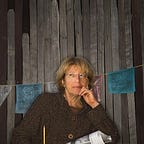The Trouble with Walter Isaacson’s New Bio of Jennifer Doudna
Walter Isaacson, who likes to write books about people whose ideas and accomplishments have created a mind shift in human history — from Da Vinci to Einstein and Steve Jobs — is a fine writer and serious researcher. (I’m not sure how his bio of Henry Kissinger fits into this pantheon of mind benders…. maybe as a modern Metternich?)
The only problem with his books — except for the bios of those who are long diseased — is that he becomes friends with his subjects. (Well, he even becomes friends with the dead ones.)
And not only does he seem to become a confidante of his subjects, the congenial biographer and veteran science writer is often friends with the subject’s competitors.
That makes Isaacson’s description of Jennifer Doudna’s CRISPR discovery, in his newest bio, The Code Breaker, and her subsequent patent fight against the Broad Institute’s Feng Zhang, then run by another Isaacson pal, Eric Lander, a see-saw soup of “she said” versus “he said” with several “they saids” (also mostly friends of the author) thrown in for further obfuscation of the real issue.
Lander quickly published in Cell — a prestigious science journal — -an excessively long account of the origins of CRISPR that hardly mentioned Doudna’s contribution and played up Zhang’s on the Broad CRISPR team. When obviously Doudna’s discovery — and the filing of her patent — came first.
I will admit that Isaacson is good on reducing genomic science to some effective metaphors, starting with Darwin’s theory of evolution through Mendel’s work with peas and two yogurt scientists whose understanding of how bacteria works in that culture contributed bits to the eventual CRISPR revelations.
And I learned that most scientists are competitive, which is why they might do obnoxious things, like use CRISPR to produce HIV-free twins, as did a scientist from Shenzhen in China, who presented his work in a conference in Hong Kong. Or they might, like Lander, minimalize the work of Doudna in favor of promoting his own guy at Broad.
Isaacson seems to ameliorate Lander’s frontal attack on Doudna because the author can empathize with Lander, another male who is not only brilliant but a fierce leader. And why characterize his behavior toward Doudna as misogynistic, when Isaacson points out that Lander has enabled the careers of many a female scientist.
This argument by the biographer waters down Lander’s skewing the truth in his Cell article to benefit his own team, not to mention the years-long CRISPR patent war against Doudna and UC Berkeley in the legal arena.
Watch out, because Lander was just appointed by President Biden to head the U.S. Office of Science and Technology Policy.
